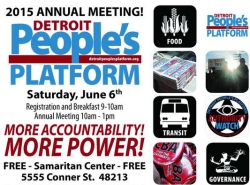Jun
10
2015

Written by Murphy Austin
“We have worked out a system to deal with the system.” These words, spoken by Detroit People’s Platform member Jocelyn Harris at our annual meeting, stand as a testament to the growing enthusiasm behind our method for social change in Detroit. Since its very first meeting on June 1st, 2013, the People’s Platform has continued to build power and hold space for collective action designed to change the way that “the system” works in our city.
This year, over 75 community activists and Detroiters from across the city came together for our third annual meeting. Our goal was to create space for accountability and feedback: members checked in with one another, clarified the Platform’s strategies, and made plans for the coming year. As a new member to the People’s Platform team, I found this meeting to be a great place to learn about the organization—how it developed and where it stands today. At every step of the way, I found evidence of the People’s Platform’s commitment to inclusion, collaboration, and informed on-the-ground action to build a more just Detroit.
Linda Campbell, a founding member of the People’s Platform, kicked off the meeting with a powerful reading on the broader analytical frame that informs our work. This reading, sourced from Right to the City, discussed the increasing privatization and corporate control in American cities, which comes largely at the expense of truly democratic processes. Nowhere have we seen this more clearly than in Detroit, which recently emerged from state-imposed emergency management and bankruptcy, which collectively resulted in a suspension of all local democratic processes, reneging on pension obligations to retirees, and privatization of one of the city’s most valuable assets—the water system—all to ensure the banks recouped their predatory “investments” from the city without addressing any of the root-cause issues. Campbell sought to deepen our understanding by situating the People’s Platform within a broader struggle. “Our vision,” she said, is a society “where all city inhabitants have the power to shape the decisions and the conditions that affect our lives.”
The annual meeting highlighted two strategies for supporting and amplifying resident power: community land trusts and community benefits agreements. Both build on the intersections between the Detroit People Platform’s five planks: good governance, quality jobs, food justice, transit justice, and land justice.
As a member of the Equitable Detroit Coalition, the People’s Platform has advocated for a local Community Benefits Ordinance, which would ensure that all development deals exceeding $15 million and using public funds first pass through a community benefits agreement negotiation process, wherein residents and stakeholders define “benefit” and work to ensure that the benefits associated with development—jobs, transit options, workforce development, economic activity—reach the communities that host and pay for them. We know that without strong community voice and representation, communities often pay for development without reaping any benefit. Participants in a breakout session led by District 6 community leader Gloria Rivera learned about how the struggle for community benefits has evolved, where it is going, and how they can be involved.
Meanwhile, district caucus leaders Linda Bain (District 5) and Jocelyn Harris (District 4) led an interactive session focusing on their work with community land trusts (CLTs). CLTs are flexible tools for securing community control of land in order to provide, create, or maintain: permanently affordable housing, open space that is accessible to all, food production and community-oriented economic development.
From my observations, this portion of the meeting was extremely successful in stimulating debate and building consensus around the work that needs to be carried out under the People’s Platform. Participants connected the “planks” of the Platform to significant problems facing their communities. Participants collectively produced a list of key action items for each city district—potential new CBA/CLT campaigns/projects and opportunities to build on the existing work. These conversations provided energizing affirmation of the People’s Platform’s strategy for action. Our members reaffirmed that yes, the problems identified by the People’s Platform members remain significant to Detroiters today, and yes, there is tangible work to be done in which all can participate. Jocelyn Harris, District 4 Captain and former board chair of the Jefferson Chalmers Citizens District Council, captured some of this positive energy around the People’s Platform: “We don’t just talk about problems, but we look for solutions to those problems. And the solutions that we find—they’re valuable because they’re based in research; they’re based in the very mechanisms that make things work.”
Throughout this meeting, I was struck by how comfortable the participants were in speaking up. Every step of the way, folks took it upon themselves to question and debate key aspects of the People’s Platform’s approach. They listened to each other in a spirit of collaboration and always sought to form a consensus about how to move forward.
The high level of participation and dialogue highlights the deep relationships between Platform members and their sense of ownership over the Platform. Thanks to two years of consistently organizing for change, most participants knew each other already, which allowed them to begin from a place of mutual commitment to a more just Detroit. And from an organizational standpoint, the People’s Platform seems to be succeeding in its goals of inclusion and accountability. By asking big questions about the People’s Platform, this year’s participants expressed confidence that their input would be honored and incorporated into the day-to-day work.
With powerful support and direction from residents, the People’s Platform will continue to build its base and the collective power of its members in the interests of securing our right to reclaim the city for our collective benefit, and that of the generations to come.
